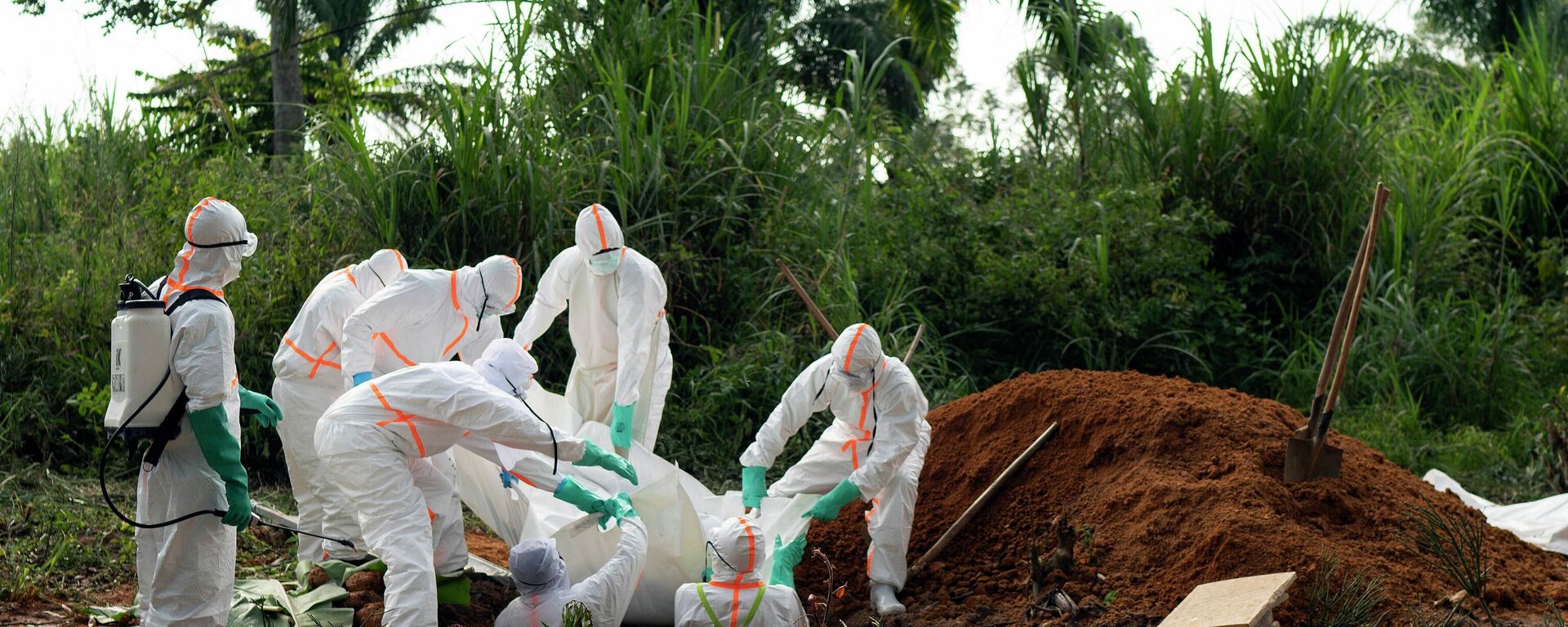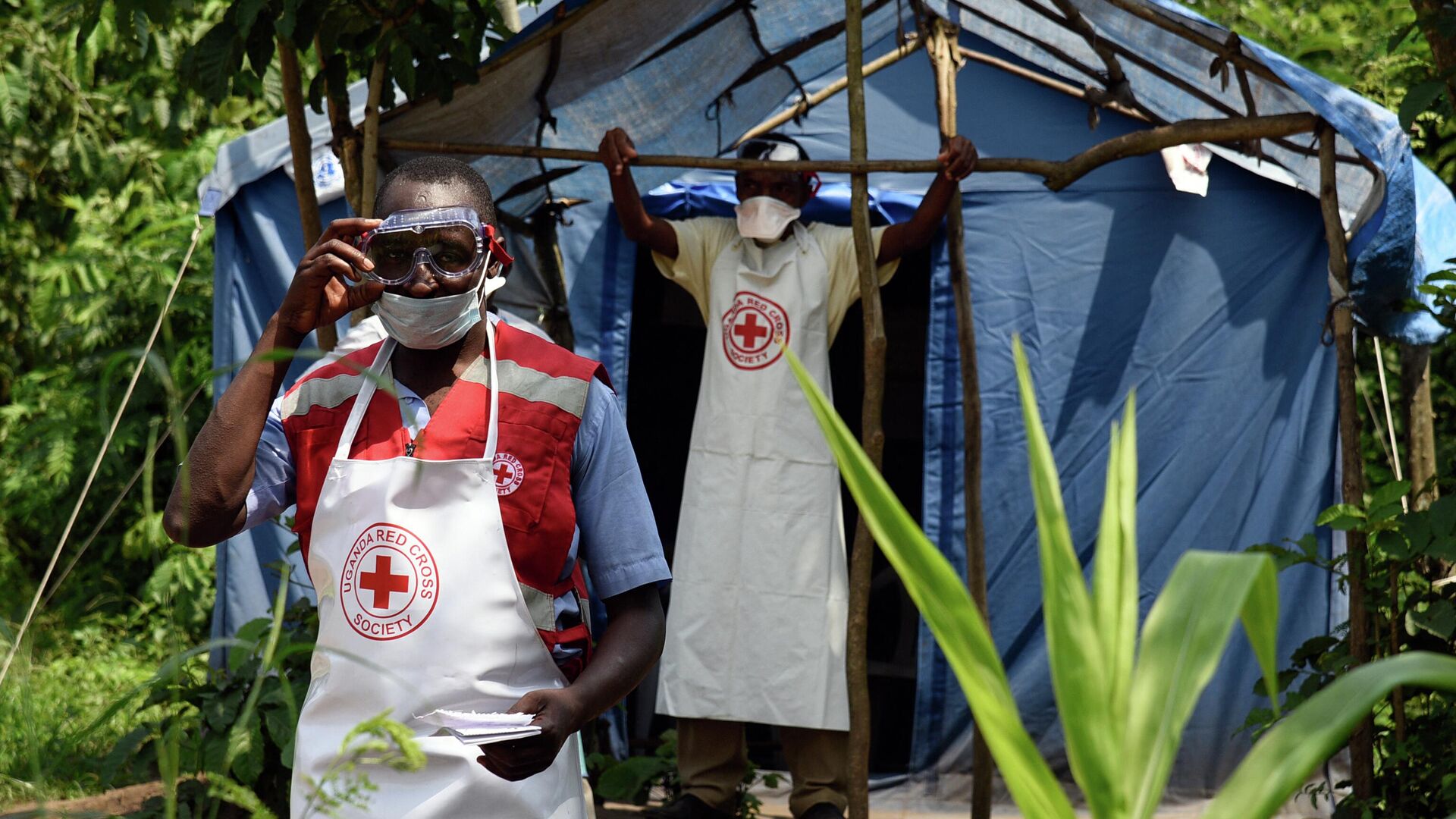https://sputnikglobe.com/20221016/nearly-one-million-quarantined-in-uganda-as-ebola-outbreak-spreads-1101897605.html
Nearly One Million Quarantined in Uganda as Ebola Outbreak Spreads
Nearly One Million Quarantined in Uganda as Ebola Outbreak Spreads
Sputnik International
The landlocked East African nation declared an outbreak of the Ebola virus disease in September. On Wednesday, health ministers from nine African countries met... 16.10.2022, Sputnik International
2022-10-16T10:18+0000
2022-10-16T10:18+0000
2022-11-14T12:50+0000
africa
ebola
uganda
quarantine
east africa
https://cdn1.img.sputnikglobe.com/img/07e6/09/17/1101149439_0:64:3072:1792_1920x0_80_0_0_09461b4934cb320755d3eb12cc4d487b.jpg
A three-week lockdown has been imposed in Uganda’s Ebola-hit central districts of Mubende and Kassanda in a bid to curb the spread of the deadly virus, the government has announced.The measures, introduced nearly a month after the country reported its first death from the virus, were presented by President Yoweri Museveni in a televised address Saturday night, and will affect nearly one million Ugandans.Exceptions are made for cargo trucks and vehicles used by the national Ebola response. Vehicles transiting through the areas will be allowed to do so pending police clearance, but are prohibited from stopping or picking anyone up along their route. Similar restrictions apply for government and security vehicles.The measures also include a 7 pm to 6 am curfew.Schools will continue to operate, but places of worship, entertainment venues, and seasonal markets have been shuttered.The regional mining sector, which includes investments from Europe and North American companies, will remain operational.The national health response will include the mobilization and deployment of 20 ambulances from other regions, plus 10 vehicles seconded for the transportation of health workers. The Ministry of Health is tasked with providing personal protective equipment.Uganda declared an Ebola outbreak in late September after detecting the Ebola Sudan strain. 58 people have been infected, with 19 dying and 20 making a recovery thanks to early detection and treatment.On Wednesday, government and health officials from Uganda, Burundi, the Democratic Republic of the Congo (DRC), Kenya, Liberia, Rwanda, Sierra Leone, South Sudan, and Tanzania met and agreed on formulating a joint response to the outbreak. The meeting was organized in collaboration with the World Health Organization (WHO) and the Africa Centers for Disease Control and Prevention – the African Union’s public health agency.Ebola is an acute viral infection affecting human beings and some other animal species, particularly primates. Human-to-human transmission of the virus can occur through the exchange of bodily fluids, or as a result of contact with objects which have been infected. Common symptoms include high fever, diarrhea, abdominal pain, vomiting of blood, fatigue, and hemorrhaging.September’s outbreak isn’t the first time Uganda has suffered an Ebola health emergency. Outbreaks were also detected in the year 2000 (when 224 people died), 2007 (when 37 died), 2011 (one fatality), 2012 (21 dead), and 2019 (four fatalities).A major Ebola epidemic struck the West African nations of Guinea, Sierra Leone, and Liberia between 2014 and 2016, infecting over 28,600 people, and killing 11,300. A global pandemic response was organized, with Cuba leading the way in deploying hundreds of doctors and health care workers to combat the health emergency. Another outbreak took place in the DRC in 2018, claiming about 2,000 lives.The World Health Organization has identified six Ebola strains with mortality ranging from 25 to 90 percent. The first strain was detected in 1976 in the DRC (then known as Zaire) and Sudan (now South Sudan). Belgian-British microbiologist Peter Piot, one of the doctors credited with discovering the Ebola virus, later recounted that the virus was unintentionally spread at the Yambuku Mission Hospital, a Catholic mission providing vitamin shots to local residents using reused, unsterilized syringes. Filovirus-carrying bats have been named the culprits behind the transmission of Ebola to human beings.
https://sputnikglobe.com/20221013/african-states-agree-on-joint-response-to-ebola-outbreak-1101790192.html
https://sputnikglobe.com/20220922/russia-offers-uganda-help-to-fight-ebola-outbreak-1101080665.html
https://sputnikglobe.com/20220527/russian-mod-presents-new-docs-on-dozens-of-pentagon-backed-bioweapons-projects-in-ukraine-1095826603.html
africa
uganda
east africa
Sputnik International
feedback@sputniknews.com
+74956456601
MIA „Rossiya Segodnya“
2022
News
en_EN
Sputnik International
feedback@sputniknews.com
+74956456601
MIA „Rossiya Segodnya“
Sputnik International
feedback@sputniknews.com
+74956456601
MIA „Rossiya Segodnya“
ebola, uganda, quarantine, east africa
ebola, uganda, quarantine, east africa
Nearly One Million Quarantined in Uganda as Ebola Outbreak Spreads
10:18 GMT 16.10.2022 (Updated: 12:50 GMT 14.11.2022) The landlocked East African nation declared an outbreak of the Ebola virus disease in September. On Wednesday, health ministers from nine African countries met to organize a joint response to the health emergency.
A three-week lockdown has been imposed in Uganda’s Ebola-hit central districts of Mubende and Kassanda in a bid to curb the spread of the deadly virus, the government has announced.
The measures, introduced nearly a month after the country reported its first death from the virus, were presented by President Yoweri Museveni in a televised address Saturday night, and will affect nearly one million Ugandans.
“Movement into and out of Mubende and Kassanda is prohibited,” Museveni
said during his address. “Public, private transport and Boda Bodas [motorcycle taxis, ed.] are not permitted to move in Mubende and Kasanda districts to curb Ebola,” he added.
Exceptions are made for cargo trucks and vehicles used by the national Ebola response. Vehicles transiting through the areas will be allowed to do so pending police clearance, but are prohibited from stopping or picking anyone up along their route. Similar restrictions apply for government and security vehicles.
The measures also include a 7 pm to 6 am curfew.
Schools will continue to operate, but places of worship, entertainment venues, and seasonal markets have been shuttered.
The regional mining sector, which includes investments from Europe and North American companies, will remain operational.

13 October 2022, 06:18 GMT
The national health response will include the mobilization and deployment of 20 ambulances from other regions, plus 10 vehicles seconded for the transportation of health workers. The Ministry of Health is tasked with providing personal protective equipment.
Uganda declared an Ebola outbreak in late September
after detecting the Ebola Sudan strain. 58 people have been infected, with 19 dying and 20 making a recovery thanks to early detection and treatment.
On Wednesday, government and health officials from Uganda, Burundi, the Democratic Republic of the Congo (DRC), Kenya, Liberia, Rwanda, Sierra Leone, South Sudan, and Tanzania met and agreed on formulating a joint response to the outbreak. The meeting was organized in collaboration with the World Health Organization (WHO) and the Africa Centers for Disease Control and Prevention – the African Union’s public health agency.
Ebola is an acute viral infection affecting human beings and some other animal species, particularly primates. Human-to-human transmission of the virus can occur through the exchange of bodily fluids, or as a result of contact with objects which have been infected. Common symptoms include high fever, diarrhea, abdominal pain, vomiting of blood, fatigue, and hemorrhaging.

22 September 2022, 10:20 GMT
September’s outbreak isn’t the first time Uganda has suffered an Ebola health emergency. Outbreaks were also detected in the year 2000 (when 224 people died), 2007 (when 37 died), 2011 (one fatality), 2012 (21 dead), and 2019 (four fatalities).
A major Ebola epidemic struck the West African nations of Guinea, Sierra Leone, and Liberia between 2014 and 2016, infecting over 28,600 people, and killing 11,300. A global pandemic response was organized, with Cuba leading the way in deploying hundreds of doctors and health care workers to combat the health emergency. Another outbreak took place in the DRC in 2018, claiming about 2,000 lives.
The World Health Organization has identified six Ebola strains with mortality ranging from 25 to 90 percent. The first strain was
detected in 1976 in the DRC (then known as Zaire) and Sudan (now South Sudan). Belgian-British microbiologist Peter Piot, one of the doctors credited with discovering the Ebola virus, later
recounted that the virus was unintentionally spread at the Yambuku Mission Hospital, a Catholic mission providing vitamin shots to local residents using reused, unsterilized syringes. Filovirus-carrying bats
have been named the culprits behind the transmission of Ebola to human beings.





